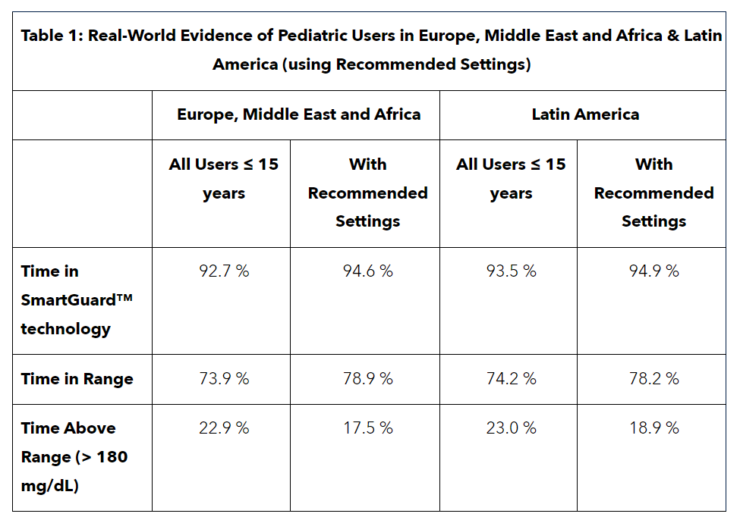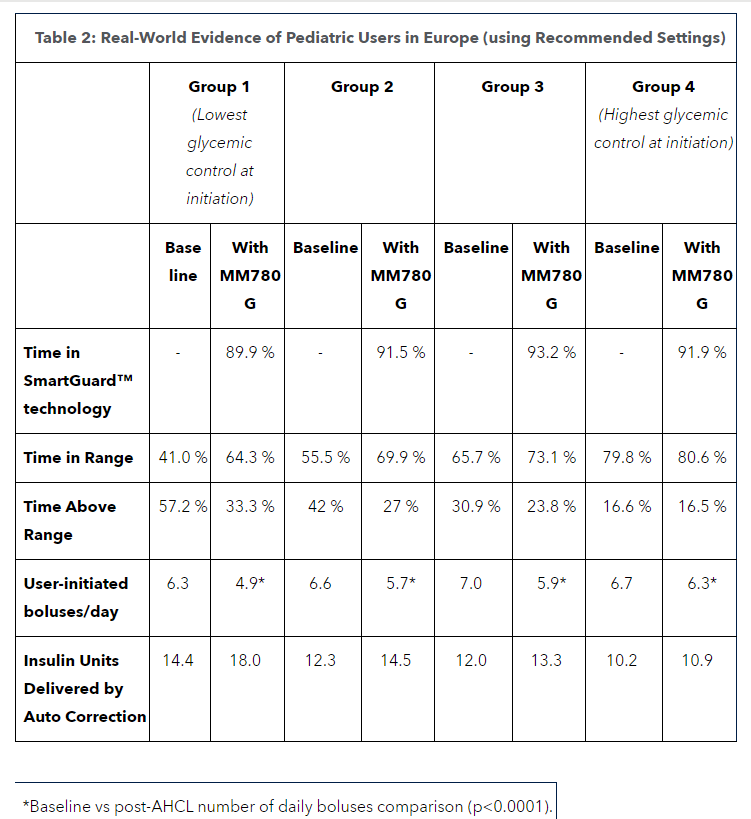Medtronic plc(opens new window) (NYSE: MDT), a global leader in healthcare technology, is presenting a robust collection of new clinical and real-world data on the MiniMed™ 780G system.

Imagfe: Medtronic
Medtronic plc(opens new window) (NYSE: MDT), a global leader in healthcare technology, is presenting a robust collection of new clinical and real-world data on the MiniMed™ 780G system. These latest data sets, which evaluated the system across a wide range of users, including historically challenging younger patients, those not meeting glycemic goals, and individuals using a simplified meal announcement leveraging fixed carbohydrate amounts instead of exact carb calculations, found that the proprietary Meal Detection™ technology supported Time in Range outcomes that exceed consensus guidelines of 70 percent. Additionally, the system is helping reduce the percent of time spent in hyperglycemia in children and adults. These latest results were presented this weekend at the 83rd American Diabetes Association (ADA) Scientific Sessions in San Diego, CA.
Simplified Meal Announcements with the MiniMed™ 780G System
The first study by Dr. Goran Petrovski, MD, PhD, of Sidra Medicine, randomly assigned adolescents using the MiniMed™ 780G system (n=34) into two groups, with some entering a fixed pre-set number of carbs (small, average, or high) and some calculating a precise number of carbs for their meals. These individuals had lived with diabetes for at least one year and used multiple daily injections or pump therapy prior to the study. Results from the study, which were presented Friday in an oral podium presentation, showed those using the simplified (i.e., fixed) carb entry maintained international targets for glycemic control, including an A1c of 6.9% and Time in Range (TIR) of 72.7% (vs. 79.4% TIR in the precise entry group) over 6 months without system modification.1 Additionally, the simplified entry group lowered their time above 250 mg/dL from 28.3% to 5.3% at six months (vs. 3.9% in the precise entry group). After 3 months, 88% chose to continue with the simplified meal management approach, which suggests user satisfaction with this less burdensome approach. These results suggest that reduced accuracy in carb counting can be overcome by the increased automated insulin delivery provided by the MiniMed™ 780G system, and that even those that cannot or do not input their carbs precisely can reach glycemic goals and reduce hyperglycemia.
“Many individuals with type 1 diabetes struggle with meal management with nearly 50% considering carb counting the most burdensome aspect of diabetes management.2 Indeed, many frequently underestimate their carbs or forget to bolus and this has an adverse impact on clinical outcomes,” said Dr. Petrovski. “This study shows that a simplified meal management approach with the MiniMed™ 780G system helped users maintain glycemic targets while providing forgiveness for inexact carb counts. Clearly there’s more runway for simplification of diabetes management with this system and it’s promising for the many patients struggling with meal management.”
Strong Real-World Performance in Children
An analysis of real-world evidence of children ≤ 15 years in Europe and Latin America (n=3,543) using the MiniMed™ 780G system with recommended settings of 100 mg/dL and 2-hour active insulin time (AIT) demonstrated a Time in Range of 78% (Table 1).3 A separate analysis of real-world evidence of children ≤ 15 years in Europe (n= 2,516) demonstrated improved glycemic performance in SmartGuard™ technology regardless of baseline glycemic control.4 The group with the lowest Time in Range (poorest glycemic control) prior to SmartGuard™ technology, had the largest increase of 23.3% in Time in Range, while patients with the best metabolic control in SmartGuard™ technology achieved 80.6% Time in Range (Table 2). Additionally, this increase in Time in Range was seen with less effort as evidenced by fewer user-initiated boluses, indicating decreased patient burden.

Medtronic Extended Infusion Set Real-World Data
For the first time, real-world data on the Medtronic Extended Infusion™ Set was presented (n=108) and the analysis showed an average infusion set wear time of 6.74 days. Almost half (48.2%) of the individuals evaluated wore the set for 7 days. This real-world data mirrors the results from the U.S. pivotal trial and is delivering a reduced user burden through less frequent infusion set changes.
“We’re committed to pushing simplification of diabetes management as far as we can and are heartened to see the impact our MiniMed™ 780G system is having on both clinical and quality of life outcomes as evidenced by our randomized controlled ADAPT study and the growing body of real-world evidence from around the world,” said Que Dallara, EVP and President of Medtronic Diabetes. “With each advancement, we’re working to reduce more of the burden that this disease demands and will continue to innovate to make life easier for those we have the privilege to support.”
Source: Company Press Release
